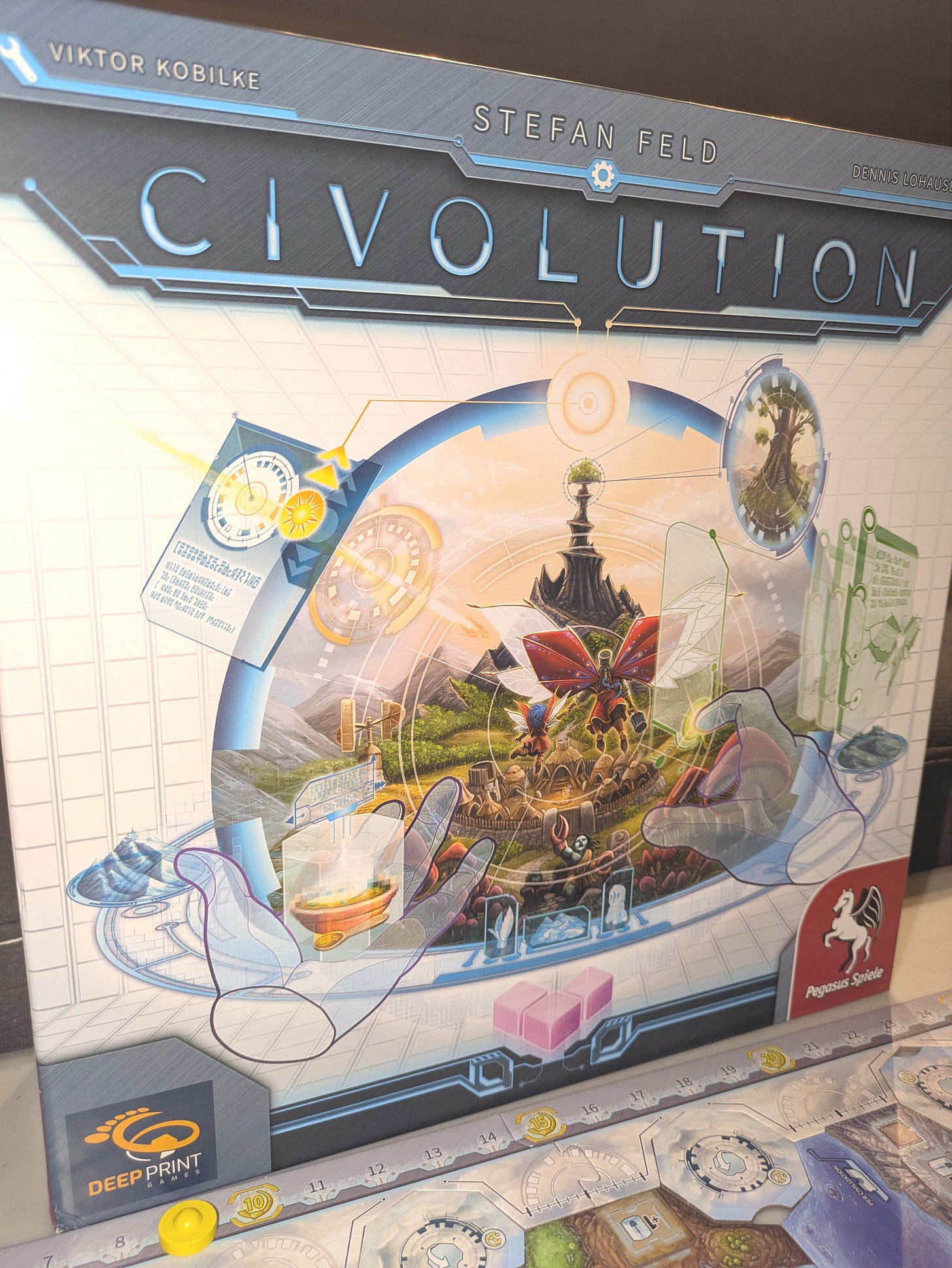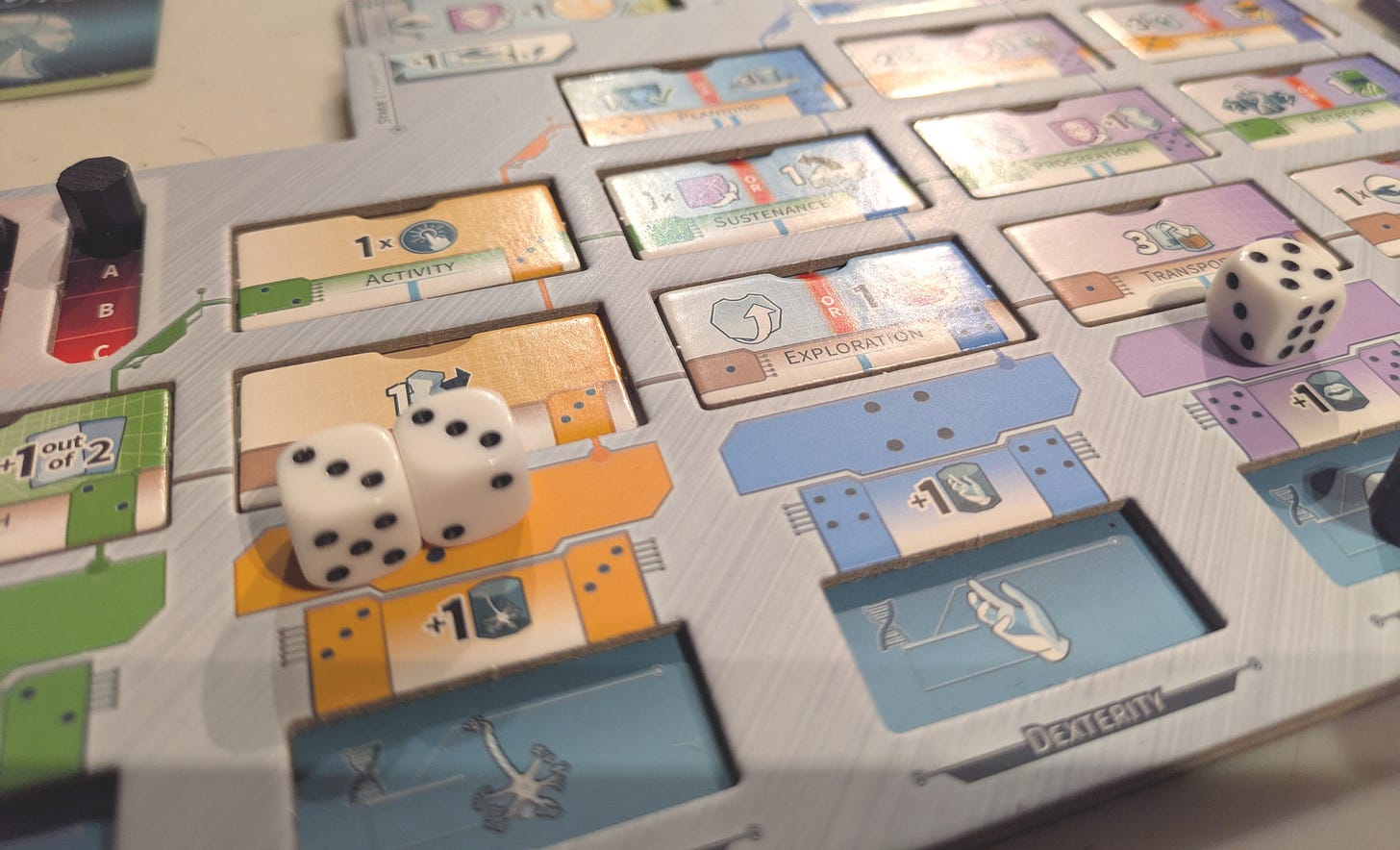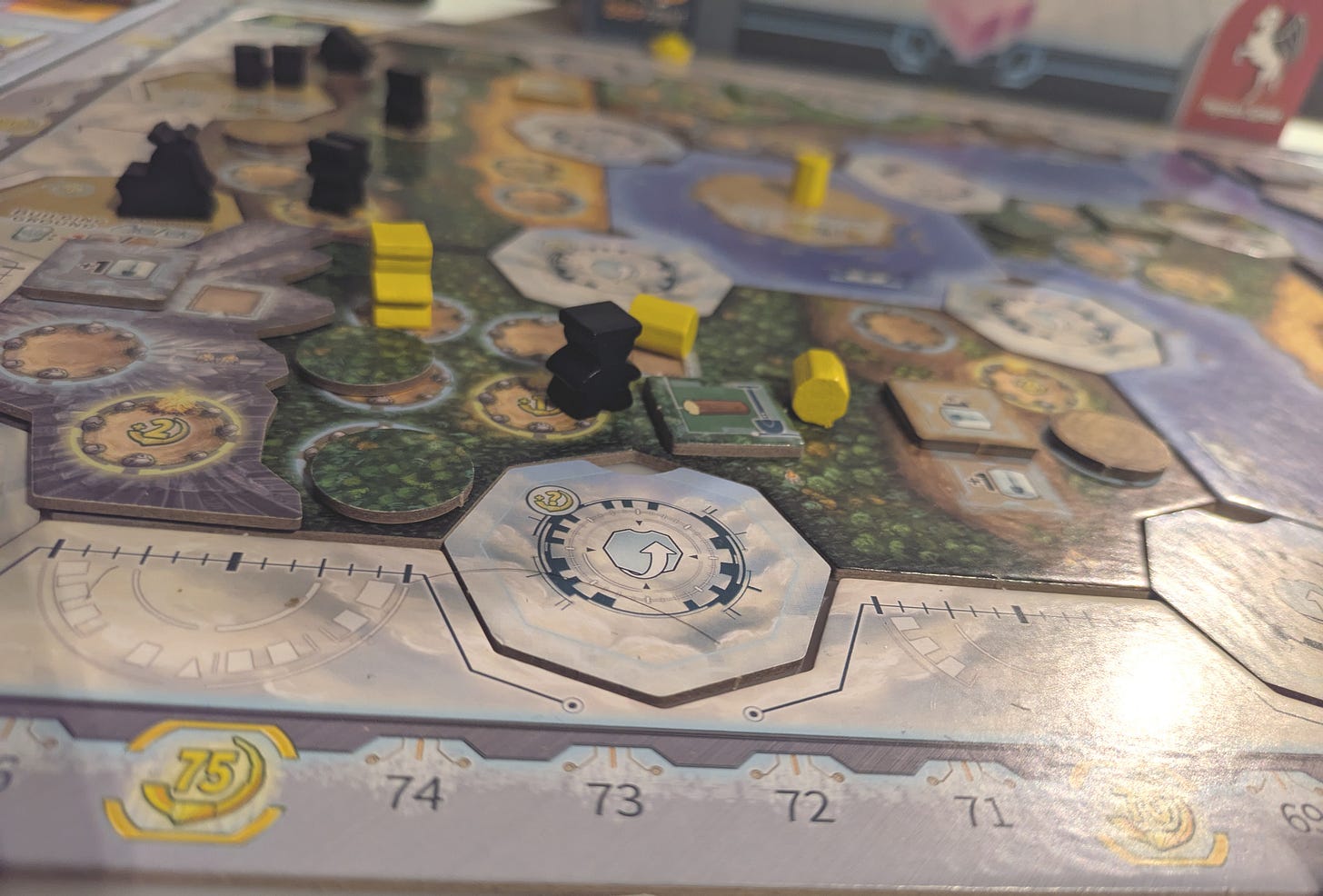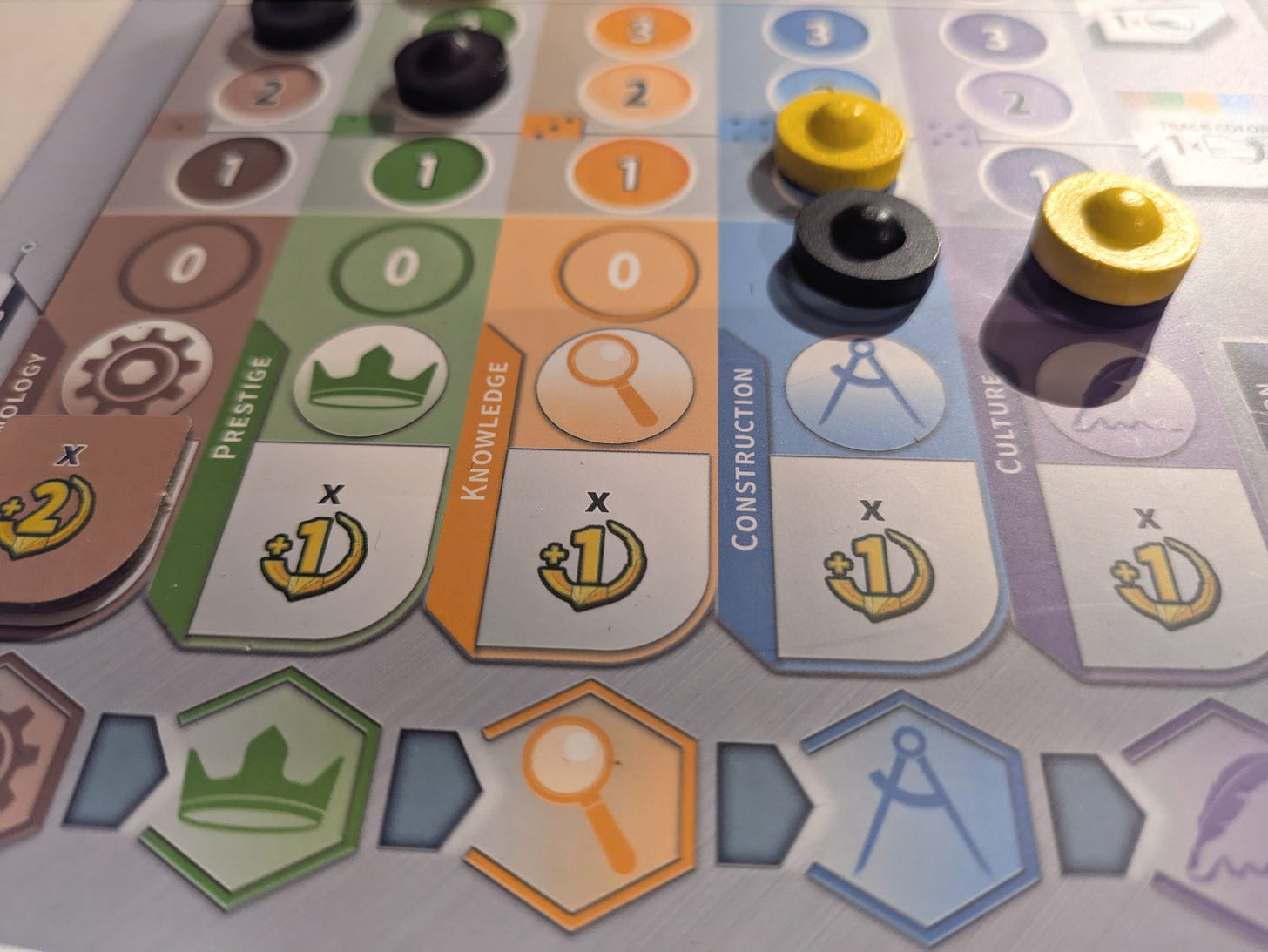Why Civolution is a Must-Have Euro Game for Strategy Lovers
Discover 5 reasons why Civolution is a must-try! From engaging dice mechanics to strategic point salad scoring, this euro game is perfect for your collection.
For the past few weeks, I’ve been completely hooked on Civolution. This euro game hitting my table more and more, and there’s no doubt—it’s staying in my collection for now.
The hype around this one has been huge, especially with designer Stefan Feld at the helm. I’ve always been curious about The Castles of Burgundy, and seeing Civolution pop up in reviewers in 2024 only fueled my anticipation. Now that I’ve played it, I can see what all the buzz is about.
I admit, I was initially hesitant about Civolution. The dice-heavy action selection made me wonder if it would feel too random. Plus, with so many different action modules, I was concerned about remembering them all and if the game would become overly complicated.
Don't get me wrong—this game isn’t perfect. It has its flaws, but the positives far outweigh them, making it a compelling experience. And yes, I’ll be diving into those flaws as well.
Here are my five reasons why this game should be in your collection.
1. Dice Mechanics
The dice mechanics are intriguing, as they dictate your available actions each round. If you've played Dune: War for Arrakis, you'll find a familiar concept here.
Of course, luck plays a role, and a bad roll can throw off your plans. However, no matter what the dice show, there’s always something you can do. Thankfully, you have 'ideas' tokens that allow you to manipulate your dice rolls, giving you some control over the outcome.
At times, it can be frustrating—maybe you were set on migrating tribes or transporting resources to storage, only for the dice to derail your strategy. It might feel like long-term planning is out of reach, but if you stay patient, the right rolls will come, and when they do, it’s incredibly satisfying.
2. Theme
The game's theme can be a major drawback, especially if you're expecting a traditional civilization experience. If you're looking for deep immersion, it's best to set that expectation aside.
While the mechanics revolve around building a civilization, they do so in a more abstract way. For example, constructing a farm provides food—but it also grants an idea token, which can be used as a wild die for actions. Gets me thinking, what does farming have to do with generating ideas? Successfully completing the game's goal provides you with valuable bonuses that can be leveraged in other aspects of the game.
Establishing settlements feels strangely detached from your tribes. Instead of fostering growth, it merely reveals a prosperity bonus that adds to your final score. This feels like a missed opportunity for thematic connection, especially since settlements are restricted to specific exploration tiles.
The weather system is a nice touch, shifting between summer and winter to affect your tribes. However, resolving event cards often feels more like fulfilling arbitrary goals for points rather than experiencing meaningful historical developments.
Despite some minor disconnects, Civolution successfully delivers on its thematic promise. You truly feel like you're guiding a civilization's growth and evolution. If you're drawn to strategic objective chasing and optimizing every action for points, you'll find this game both stimulating and rewarding.
3. Point Salad System
This seemed overwhelming at first, especially since I don’t have many point salad-style games in my collection aside from Terraforming Mars.
For those unfamiliar with the term, a point salad system means that nearly every action you take earns points, with multiple ways to score. Instead of relying on just one or two main strategies, players can accumulate points from a variety of sources, creating a "salad" of scoring opportunities.
This is what keeps Civolution engaging—the abundance of scoring options constantly pushes you to experiment with different approaches, whether you're trying to outscore the bot or compete against friends and family.
Some games make scoring overly complex (Imperium: Horizons comes to mind), which can be a turnoff for some players. One of Civolution’s strengths is how easy it is to track points. Simply moving the main marker in each category and adding up your score keeps the process streamlined. It also adds tension, as you and your opponent race to see who can reach the highest total.
4. GamePlay
Every action or strategic decision you make is part of a larger chain, where each step unlocks new opportunities and pushes your progress forward.
For example, if you need resources, your tribes must produce them. But before they can do that, you first need to expand into different territories to gather the right resources.
And what’s the purpose of these resources? They allow you to play cards in your console area, which ultimately contributes to your final score.
See what I mean? The game is full of interconnected mechanics—choosing a specific path often leads to greater rewards down the line.
Of course, some players argue that gathering resources takes too many actions and feels difficult. But isn’t that the point? If it were too easy, the game wouldn’t be nearly as engaging or rewarding.
The objectives add another layer of excitement to the game. Completing goals allows you to upgrade your action modules, while the main weather event rewards the most successful player in key resource areas.
Additionally, meeting the era’s scoring objectives helps you accumulate points at the end of each era, keeping the competition engaging and dynamic.
5. Solo Mode
I’ve played this game well over five times, all solo against the V.I.C.I bot. Compared to other solo euro games I’ve tried, this bot is much easier to manage and far less mentally draining.
V.I.C.I’s turns are quick yet consistently challenging, making each game feel different. The bot tends to aggressively climb the research track, while other times it rapidly migrates and expands its tribes across the continents.
That said, it tends to neglect certain aspects, like building settlements or boats, which means you rarely feel pressure to construct a boat in specific territories. Instead, it focuses on blocking key areas, like farms and hunting grounds, by placing tokens where your tribes are located. While this hasn’t significantly impacted my games, I imagine it could create more tension in a three- or four-player match.
Solo gamers will find Civolution a solid and engaging experience. The solo mode's challenging scenarios push you to explore diverse strategies, effectively accelerating your learning curve. Notably, the game's design lends itself well to solitary play, and even with others, it maintains a puzzle-like feel with added map interaction.
Conclusion
After spending weeks diving into Civolution, it’s clear this game offers a lot to explore. The unique dice mechanics, layered strategy, and abundance of scoring opportunities make for an engaging experience that keeps me coming back. While the theme might not be the most immersive, the gameplay itself is rich with decision-making and rewarding combos that make every session feel different.
The solo mode is another highlight, providing a solid challenge without being overly complicated or tedious to manage. And while the game isn’t perfect—some aspects can feel abstract or mechanical—the overall experience is compelling enough to keep it in my collection for now.
Whether you’re a fan of Stefan Feld’s designs or just enjoy a deep, strategic Euro with plenty of optimization, Civolution is worth checking out. If you thrive on maximizing actions and chaining benefits together, this game will likely keep you hooked, just like it has for me.







